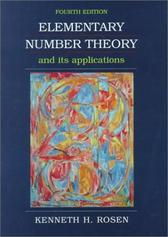
Number Theory
 |
Number Theory |
Instructor Sorin Popescu (office: Math 4-119, tel. 632-8358, e-mail sorin@math.sunysb.edu)
Time and Place TuTh 02:20pm-03:40pm, SBU 226
| Prerequisites |
Either MAT 312 (Applied algebra), or MAT 313 (Abstract Algebra) or MAT 318 (Classical Algebra) are mandatory prerequisites for this class. In general basic algebra exposure is required and assumed, but I will try to keep prerequisites to a minimum.
| Textbook(s) |
|
Elementary Number Theory and Its Applications , by Kenneth Rosen, (fourth edition)
Addison-Wesley 2002. This is a very nice textbook that integrates classical (elementary) topics in number theory with lots and lots of applications to cryptology, computer science, etc. It also features a number of computer (programming) projects, mainly for Mathematica and Maple. There are many other excellent undergraduate books on the subject. Here is a sample (all of them available in our library):
|
 |
| Course description & Homework assignments |
We will cover only part of the textbook and the following schedule may/will be adjusted based on students' preparation and progress. Problems marked with an asterisk (*) are for extra credit.
| Date | Topic | Homework | Notes | |
| Wk 1 | ||||
| 1/23 | 1.1 Numbers, sequences, and sums | p14/2,4,26,27;
p22/5,10,16,30; p28/4,8,22; due 02/04; solutions |
||
| Wk 2 | 1/28 | 1.2 Mathematical induction; 1.3 Fibonacci numbers | Fibonacci links | |
| 1/30 | 1.4 Divisibility; 3.1 Prime numbers | p34/4,16,28; p76/2,6,10; p84/6,7,13,31; due 02/11; solutions |
Half hour pretest | |
| Wk 3 | 2/4 | 3.2 Greatest common divisor | Primes links | |
| 2/6 | 3.3-3.4 Euclidean algorithm, Fundamental theorem of arithmetic | p94/5,7,19*; p123/2, 3, 6 p104/4, 10, 16*, 32, 35, 46; due 02/18; solutions |
||
| Wk 4 | 2/11 | 3.6 Linear Diophantine equations | ||
| 2/13 | 4.1-4.5: Congruences | p123/4, 21; p135/5, 22, 26, 28, 38*; p141/2, 6, 8; due 02/25; solutions |
||
| Wk 5 | 2/18 | p149/4a)-b), 12, 22, 24; p159/1, 10; p167/2, 4, 8b, 14* due 03/04; solutions |
||
| 2/20 | p177/12,19,22; p195/8,12,13,16,17 due 03/11; solutions |
|||
| Wk 6 | 2/25 | |||
| 2/27 | 5.1 Divisibility tests | |||
| Wk 7 | 3/4 | 6.1-6.2 Wilson's theorem, Fermat's little theorem, pseudoprimes |
p202/3, 12, 15, 20, 22, 23; p213/2, 7 due 03/27; solutions |
First project due |
| 3/6 | ||||
| Wk 8 | 3/11 | Midterm [exam] [solutions] | ||
| 3/13 | 6.3 Euler's theorem | |||
| Recess | ||||
| Wk 9 | 3/25 | 7. Multiplicative functions | p218/1, 6, 8, 12; p227/1, 2(c,e), 3, 5, 14, 35
due 04/3; solutions |
|
| 3/27 | ||||
| Wk 10 | 4/1 | p235/2(a-c), 21, 22, 23, 24, 34*, 37*
p257/1(a,b), 15,17,18,23; due 04/10; solutions |
||
| 4/3 | 8. Cryptography | |||
| Wk 11 | 4/8 | p267/3, 14, 15 p278/1, 3, 4*, 13, 18, 19 p290/1, 3, 4*, 6, 7, 11*; due 04/22; solutions |
||
| 4/10 | ||||
| Wk 12 | 4/15 | p304/1, 6, 10; p313/1, 6, 10, 18*;
due 04/29; solutions |
04/16-04/18 no classes Passover |
|
| 9. Primitive roots | ||||
| Wk 13 | 4/22 | p319/3, 8, 12, 16; p337/2, 4, 9
due 05/06 |
Second project due | |
| 4/24 | ||||
| Wk 14 | 4/29 | 11. Quadratic residues | ||
| 5/1 | ||||
| Wk 15 | 5/6 | |||
| 5/8 | Review | |||
| 5/20 | Final exam 2:00-4:30pm (SBU 226) | |||
| 5/20 | Review 05/16, 4:00pm-5:30pm (Math Towers P-131) |
| Projects, Homework & Grading |
Homework (see above) and projects (TBA) are an integral part of the course. Problems marked with an asterisk (*) are for extra credit. In addition you will be required to hand in 2 research/scholarship/computing projects. Projects with a nontrivial writing component may be used to satisfy the Mathematics Upper Division Writing Requirement.
Your grade will be based on the weekly homeworks (20%), two projects (15% each), midterm (20%), and the final exam (30%). The two lowest homework grades will be dropped before calculating the average.
The Math Learning Center (MLC), located in Room S-240A of the Math Tower, is an important resource. It is staffed most days and some evenings by mathematics tutors (professors and advanced students). For more information and a schedule, consult the MLC web site.
| Software |
| Links |
The following is a short list of web sites devoted to number theory or number theoretic related topics relevant for our class:
| Special needs |
If you have a physical, psychiatric, medical or learning disability that may impact on your ability to carry out assigned course work, you may contact the Disabled Student Services (DSS) office (Humanities 133, 632-6748/TDD). DSS will review your concerns and determine, with you, what accommodations may be necessary and appropriate. I will take their findings into account in deciding what alterations in course work you require. All information on and documentation of a disability condition should be supplied to me in writing at the earliest possible time AND is strictly confidential. Please act early, since I will not be able to make any retroactive course changes.
Sorin Popescu